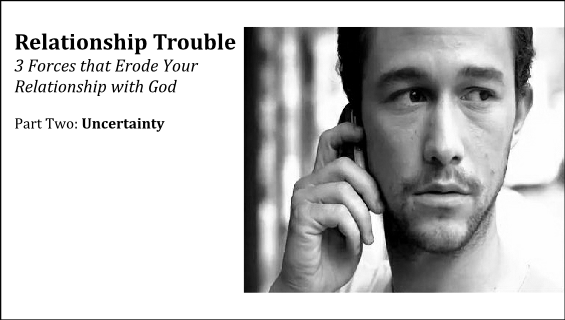By Tyson Thorne

A few years ago I was giving a Biblically-based tour of the Morrison Formation (known as Dinosaur Ridge) outside of Denver, Colorado. We examined trace fossils of plant and marine life, and dinosaur footprints and bones. It’s all outdoors and in the open so there are no admission fees and anyone can stop by and see the exhibits and read the placards. About half way through I was leading my group to the next stop when an older bystander approached and asked me forthrightly, “You don’t really believe the earth is only 6,000 years old, do you?”
When confronted – especially in public – it is easy to fall prey to uncertainty. There are two kinds of uncertainty that may plague us –knowing or suspecting you don’t have the answers, and the uncertainty that you don’t have all the facts. Both came into play during this encounter.
Predictably I answered the stranger, “I do.” The man sneered and started walking away. That could have been the end of it and no harm would have been done, but I was convinced God had made the arrangements for this meeting. So I called after him as loudly as he had questioned me and asked, “Excuse me, how do you know it isn’t?” He came back grinning from ear to ear.
The man was a doctor of geology and professor at the Colorado School of Mines. My specialty is Biblical Studies, not geology or anything close to it. Clearly I was out of my depth in any discussion of geology, and I had three choices before me. One, I could succumb to uncertainty – the realization that I don’t have all the knowledge this man did on the subject – and allow him to control the conversation and teach my students his ideology. Two, I could try and fake it in an attempt to salvage my reputation in the debate. I chose option three, to use the Socratic Method to show how uncertain the science behind finding the age of the Earth really is.
Some friends of mine and I commonly use what we call the Four Killer Questions, which are straight from the teachings of Socrates. The questions are:
1. What do you mean by that?
2. How do you know that to be true?
3. What difference does that make?
4. What if you are wrong?
By carefully selecting from among these four questions I was able to get the professor to paint himself into a corner and reveal that the arguments for the earth being billions of years old was based more on assumptions than on science.
Admittedly, this was a rare encounter that turned into a tremendous opportunity to show just how useful the Killer Questions can be. As useful as they are, however, they will not always save us from our own ignorance. I’ve met and witnessed too many ministers become disillusioned and fall away when faced with arguments they cannot overcome. As children of God there will be times we will be confronted about our beliefs and we will not know the answers. At such times there is no shame in admitting that you don’t know, but that you will find out. When you learn the truth be sure to follow up with the challenger. You may not win every debate, but you can hold on to your integrity by not faking it and espousing information you are unsure of. Remain true to your faith in God and open to the lessons such encounters provide.
For a great example of how not to succumb to uncertainty and instead learn more of God’s truth and become a powerful influence for the kingdom, read about Apollos in Acts 18.24-.28.
|
|
|
